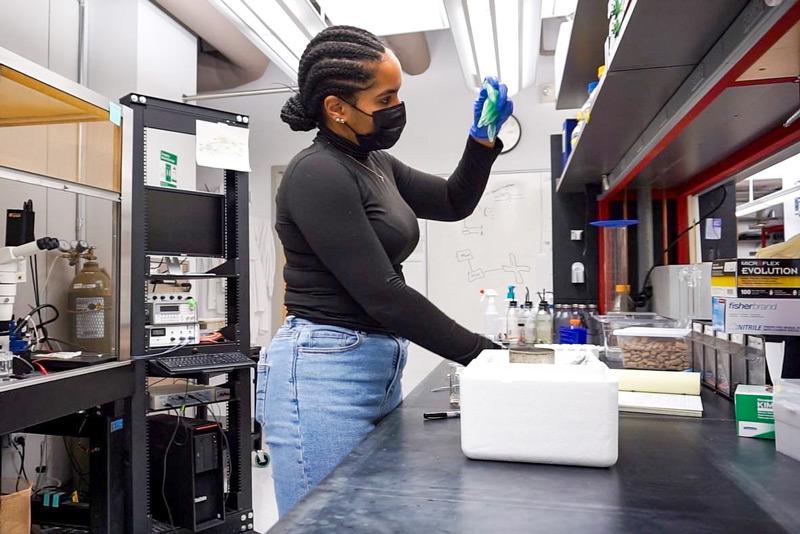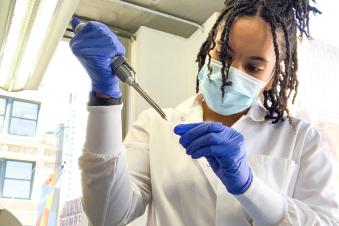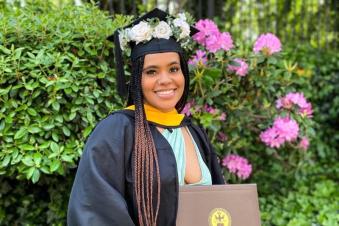-
About
- Departments & Offices
-
Academics
- Public Health
- Biomedical Sciences
- Physician Assistant
- Special Master’s (MBS)
-
Admissions & Financial Aid
- Tuition & Fees
-
Student Experience
-
- Student Resources by Program
- Academic & Student Support
- Wellness & Wellbeing
- Student Life
- Events & Traditions
-
-
Research
- Research Labs & Centers
- Tufts University-Tufts Medicine Research Enterprise
-
Local & Global Engagement
- Global Health Programs
- Community Engagement
Tauryn L. Dargan, MBS22
"As it was my first laboratory research experience, I couldn’t have been more pleased. I found a new love for neuroscience and epilepsy and gained invaluable mentors along the way."

The MBS program thesis requirement allows students to dive into a field of their interest and get real, applicable research experience. Meet Tauryn L. Dargan, MBS22, and hear about her thesis and experience in the MBS program.
Why did you choose to pursue this degree, and why Tufts?
"After a severe concussion devastated my GPA in undergrad, I felt that I would never be a good enough candidate for medical school. I retook any classes I failed but wasn’t confident enough in my study skills or academic record to apply to medical school. The premed chair at Boston College suggested that I apply to Special Master's programs and gave Tufts a glowing recommendation. After doing some research on the program and school, I felt that Tufts aligned well with my values, especially in terms of diversity and community service."
What is your favorite aspect about the program?
"My favorite thing about the program is the confidence that is instilled in you from MBS Orientation until graduation. Our professors and program directors believe in our abilities and never missed a chance to tell us how capable and amazing we were. Our professors always made the time and effort to be available for meetings, tutoring sessions, office hours, and made sure that material was not just heard but understood. I came out of the MBS program feeling confident in my study skills, critical thinking, and work ethic."
What is the focus of your thesis requirement?
"For my thesis project, I worked in the Tufts Neuroscience lab of Dr. Jamie Maguire. We hypothesized that previous stress exposure increases seizure susceptibility and worsens seizure outcomes. To test this hypothesis, we examined the impact of previous exposure to chronic unpredictable stress (CUS) on epilepsy outcomes using both acute and chronic seizure models. I was responsible for every aspect of my project including stereotaxic surgeries, EEG head mount implantation, behavioral testing, immunohistochemistry, imaging of tissues, and so much more. This study was a novel contribution to the field and took the first steps in understanding the relationship between chronic stress and epilepsy outcomes, and I hope that the promising preliminary data will lead to additional studies that help human epilepsy patients. As it was my first laboratory research experience, I couldn’t have been more pleased. I found a new love for neuroscience and epilepsy and gained invaluable mentors along the way."
What do you want a prospective student to know about Tufts?
"I want any prospective students to know that you are not alone at Tufts. No matter what your previous background is, you don’t have to try to achieve your dreams on your own. Tufts is invested in making you a more confident and capable student and will provide any resource they can to help you reach your goals, but closed mouths don’t get fed, so you can’t be afraid to ask! Ask for help, ask for advice, ask for mentorship, and ask to utilize everything they have to offer!"
Learn More About the MBS Program

